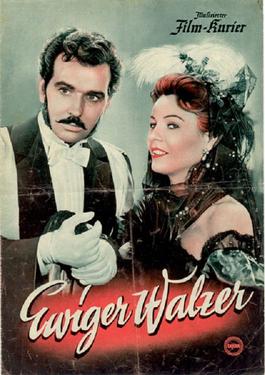
The Eternal Waltz is a 1954 West German drama film dramatizing the life of Johann Strauss II. The initial story was written by Hanns Marschall and Ruth Charlotte Silbermann, and the film itself was written by Alexander Lix; the adaptation was by Paul Verhoeven who also directed the film.

The Three from the Filling Station is a 1955 West German musical film directed by Hans Wolff and starring Adrian Hoven, Walter Müller and Walter Giller. It was shot at the Tempelhof Studios in West Berlin and on location around the city. The film's sets were designed by the art directors Kurt Herlth and Hans Kuhnert.
Carl Raddatz was a German stage and film actor. Raddatz was a leading man of German cinema during the Nazi era appearing in a number of propaganda films and romances. Later in his career he developed a reputation for playing benevolent father figures.
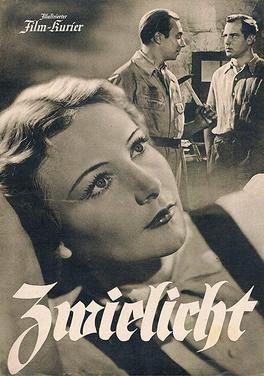
Twilight is a 1940 German drama film directed by Rudolf van der Noss and starring Viktor Staal, Ruth Hellberg and Carl Raddatz. The film's art direction was by Hermann Asmus and Carl Ludwig Kirmse.

The Boxer's Bride is a 1926 German silent sports film directed by Johannes Guter and starring Xenia Desni, Willy Fritsch and Hermann Picha.
Hallig Hooge is a 1923 German silent film directed by Carl Froelich and starring Dora Bergner, Evi Eva and Willy Fritsch.
Love's Joys and Woes is a 1926 German silent comedy film and directed by Kurt Gerron and Heinz Schall and starring Charlotte Susa, Margarete Kupfer and Hilde Maroff.

Holiday From Myself is a 1952 West German comedy film directed by Hans Deppe and starring Rudolf Prack, Marianne Hold and Willy Fritsch. It was shot at the Göttingen Studios with sets designed by the art director Ernst H. Albrecht. It is a remake of Deppe's 1934 film of the same title.
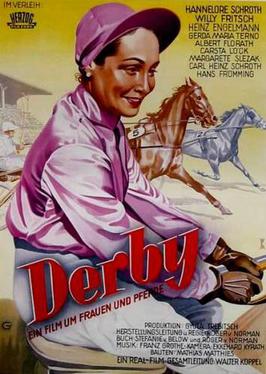
Derby is a 1949 West German sports film directed by Roger von Norman and starring Hannelore Schroth, Willy Fritsch, and Heinz Engelmann.

My Niece Susanne is a 1950 West German musical comedy film directed by Wolfgang Liebeneiner and starring Hilde Krahl, Inge Meysel and Harald Paulsen. It is set in Paris at the beginning of the twentieth century.

White Shadows is a 1951 West German drama film directed by Helmut Käutner and starring Hilde Krahl, Hans Söhnker and Claude Farell.

Night of Decision is a 1956 West German drama film directed by Falk Harnack and starring Carl Raddatz, Hilde Krahl and Albert Lieven. It was shot at Göttingen Studios and on location in Belgium. The film's sets were designed by the art directors Walter Haag.
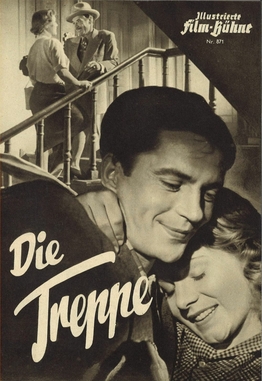
The Staircase is a 1950 West German drama film directed by Alfred Braun and (uncredited) Wolfgang Staudte, and starring Hilde Körber, Herbert Stass and Paul Westermeier. It was partly shot at the Wiesbaden Studios in Hesse. The film's sets were designed by the art directors Paul Markwitz and Fritz Maurischat.

The Road to Paradise is a 1956 French-German romantic comedy film directed by Willi Forst and Hans Wolff and starring Georges Guétary, Christine Carère and Claude Farell. The film is the French version of the 1955 German film The Three from the Filling Station, which was itself a remake of a 1930 film.

Dreaming is a 1944 German historical musical drama film directed by Harald Braun and starring Hilde Krahl, Mathias Wieman and Friedrich Kayssler. It portrays the lives of the pianist Clara Schumann and her composer husband Robert Schumann.

Her Other Self is a 1941 German drama film directed by Wolfgang Liebeneiner and starring Hilde Krahl, Mathias Wieman, and Erich Ponto.

Island of the Dead is a 1955 West German drama film directed by Viktor Tourjansky and starring Willy Birgel, Inge Egger and Folke Sundquist. It was shot at the Bavaria Studios in Munich. The film's sets were designed by the art director Dieter Bartels and Wilhelm Vorwerg. It premiered at the Marmorhaus in Berlin.

Serenade is a 1937 German drama film directed by Willi Forst and starring Hilde Krahl, Albert Matterstock and Igo Sym. The film was based on a novel by Theodor Storm, which was adapted again in 1958 as I'll Carry You in My Arms by Veit Harlan.

Oh Those Glorious Old Student Days is a 1925 German silent film directed by Eugen Rex and Heinz Schall and starring Eugen Klöpfer, Maria Zelenka, and Hans Mierendorff.
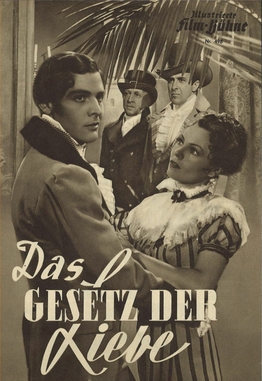
Law of Love is a 1949 German historical drama film directed by Hans Schweikart and starring Hilde Krahl, Paul Hubschmid and Ferdinand Marian. Production began in 1944 during the Nazi era and was completed by 1945, but the end of the Second World War led to delays in its distribution as also occurred with several other productions. It was not released for a further four years until its premiere in Erlangen, Bavaria in the newly established West Germany. Its West Berlin premiere took place in May 1950.

















